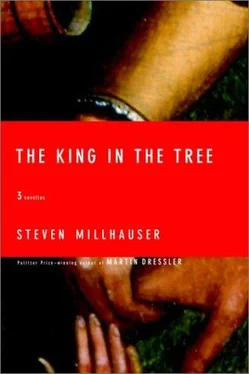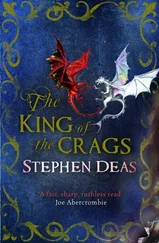That night Don Juan dreamed that he and Augustus Hood were walking in his father’s orchard on the bank of the Guadalquivir. Hood was pointing up at an orange tree with his walking stick, which he handed to Juan, who raised it to his eye like a telescope and looked at an orange that suddenly leered at him and stuck out its tongue, and when he swung the telescope at it he saw that he was holding in his hand a gondolier’s oar, he was rowing through the watery spaces between trees hung with jewels, and the next day he left Venice and headed north.
“Adam was the first gardener,” Augustus Hood remarked, stepping from a cypress grove onto a grass path that led to a distant grotto.
“And this, then, is a second Eden,” Juan gallantly replied, sweeping out an arm. They were speaking Italian; Juan held in one hand a small English grammar bound in buckram.
“In English—” Mary Hood began, in English.
“Before or after the Fall, Sir?” her sister Georgiana remarked in French, and Juan, turning to look at her, again had the irritating sense that he couldn’t tell whether her remark was in earnest or whether she was being mischievous in some elusive English way.
“In inglese,” Mary Hood said, and then returned to English, “we say ‘Eden.’ ‘Eeeee-den.’ You see: ’tis the same word. La stessa parola. ”
The sisters, each wearing a flat straw hat with a low crown tied round with silk ribbons, stepped onto the path rippling with sunlight and leafshade. The front and back of the wide hat-brims were turned up, and the edges of the lace undercaps showed beneath.
“That, Georgiana, depends entirely on the divine plan,” Augustus Hood mysteriously remarked. “Why, here’s a jolly fellow. Look! An usignuolo. ”
“Nightingale,” Mary Hood said. “Night. In. Gale.”
“Pouring forth its melodious song,” Georgiana said.
And indeed a nightingale was pouring forth its song from a low branch at the shady border of the grove. Hood walked quietly up to the bird and, to Juan’s surprise, took it gently in his hand. The squire of Swan Park was continually surprising him.
“Here,” Hood said, handing the bird to Juan. The nightingale sat very still in his hand — was this a habit of English birds? “I made it myself,” Hood continued. The bird was covered with real feathers; under one wing was a small pin that operated a spring.
“Your husband is a man of many surprises,” Don Juan remarked to Mary Hood, who smiled pleasantly at him and lowered her hat-shaded eyes, while Georgiana Reynolds looked at him with a faint smile that might have meant “And you, Sir, are a great fool” or “What an amusing thing to say” or anything else or nothing at all. Juan examined the bird and returned it to Augustus Hood, who replaced it carefully on the branch and led them up the path.
But Swan Park was in truth a surprising place, a realm of wonders, an artful Eden, of which Augustus Hood was the presiding genius. He had designed every feature of his two hundred acres of gardens, including the grottoes, the cascades, the mounts, the serpentine streams, the sudden openings onto distant prospects, the seats under shady trees, the ruined priory, the Temple of Flora, the scenes arranged to remind the wanderer of paintings by Salvator Rosa, Nicolas Poussin, and Claude Lorrain. Beyond the gardens lay four thousand acres of parkland, which Hood had also designed and which he had promised to show his guest in the coming days. The brilliant art of English landscape gardening had swiftly replaced the dreary old rigidities of the continental style, but in Hood’s view the revolution had barely begun, and in any case was not sufficiently understood even by those in the vanguard of the movement. It was all very well to turn away from artifice in the direction of the natural and wild, but those wild prospects, those tumbling cascades and rugged grottoes, were all the work of ingenious artificers. You might say that the wilder the prospect, the more cunning the hand of the maker. If the movement toward the natural were taken to its logical conclusion, there would be no distinction whatever between Nature and the English garden. No, the true way was to assert artifice even in the act of paying homage to Nature.
“Ingenious, certainly,” Georgiana was saying. “But is the real nightingale any less wonderful? Can anyone possibly believe that Nature herself is without design? For my part—”
“You must forgive us,” Mary Hood said. “We English are rather fond of argument.”
“I am not arguing, Mary, I am merely saying that in this age of mechanical ingenuity—”
Don Juan listened with delight to the voices of the Englishwomen, one speaking Italian, the other French, a language he understood nearly as well — the one with a gentle, musical voice, the other more energetic and abrupt, reaching higher and lower in the scale — while greenish shadows rippled down onto the cream-colored and sky-blue silk of their hooped gowns. It was a brilliant summer afternoon. Everything interested him: the wide, forearm-length cuffs of Hood’s coat, the tight horizontal side-curls of his wig, the figure of Moses striking water from a rock at the top of a cascade, the silk ribbons around the sisters’ necks, the Rotunda with its telescope and its view of the river Ymber, the Garden of Shakespeare with its sixty-four statues of comical and tragical characters in dramatic attitudes, Hood’s explanation of the construction of a rill. At the top of the path they entered the cool grotto, passed out the other side into a picturesque meadow bordered by a wood, and walked along a winding path that somehow led back to the great house.
Dinner was served at four o’clock on the broad lawn that sloped down to the Ymber. Osiers trailed their branches in the slow brown water; a few swans swam flickering through sun and shade. On the grass by the riverbank was a stone bench on which lay a yellow silk pillow, a fan with ivory sticks, and a book bound in red morocco. A footman stood before Don Juan, holding out a silver bowl containing bunches of grapes so purple and glistening that they looked like a painting of a bowl of grapes, each with its careful highlight. Juan dropped a grape into his mouth, hesitating a moment, as if it might be an object of wax, before biting down and feeling the juice burst against his tongue — and while Mary Hood smiled at her husband under the shade of her hat, and Georgiana brushed an ant from her blue silk shoulder, and the pleasant voice of Augustus Hood was saying that a universe was not precisely like a pocket watch, and beyond the river a field of hayricks lay burning in the sun, Don Juan felt a rich sense of peace, of relaxation, as if for a long time he had been clenching unknown muscles. He felt ten years old again, listening to his father explaining how the flower ripens into the fruit, in the orchard that went down to the Guadalquivir. Venice seemed a dark dream, a fever-vision from which he had wakened to a new morning. Don Juan had no intention of sparing the women— idly he wondered whether Mary or Georgiana would lead the way — but for the first time in his life he was in no hurry.
Over the next few days a loose, easy-flowing routine was established at Swan Park. Don Juan, who was accustomed to rising late in the morning, would come down to find that Squire Hood had risen six hours earlier and was out supervising one of his many projects in the gardens or parkland. Mary and Georgiana had eaten at nine but sat with Juan in the breakfast room as he was served the third breakfast of the day: hot brown bread, honey, hot chocolate, buttered toast, and a pot of steaming tea. The three would then walk along the river, or on one of the many garden paths, as they awaited the return of Squire Hood. He would come galloping along the riding path, swing from his horse, cry “Hah!” or “Gad, what a day!” and burst into enthusiastic talk about his projects as he took a short turn with them in the gardens before riding off with Juan to the farthest reaches of Swan Park. The gentle squire, Juan thought, was like a fire — or a Spanish rake: he was always burning. They returned for dinner at four, in the high dining room or on the lawn above the Ymber. Hood, dressed carelessly in riding boots and an old broadcloth coat, consumed platefuls of roast veal and pigeon pie washed down with cider and red port as he discussed everything under the sun: the operation of a silk loom, the superiority of timber props to pillars of coal for supporting the roofs of mines, the idea — shocking to Juan — that modern battle heroes depicted in paintings ought to be shown in contemporary garb instead of in Greek or Roman armor. The elaborate dinner, lasting two hours, ended with bowls of gooseberries, thick wedges of currant pie, orange pudding, and pots of green and black tea.
Читать дальше












